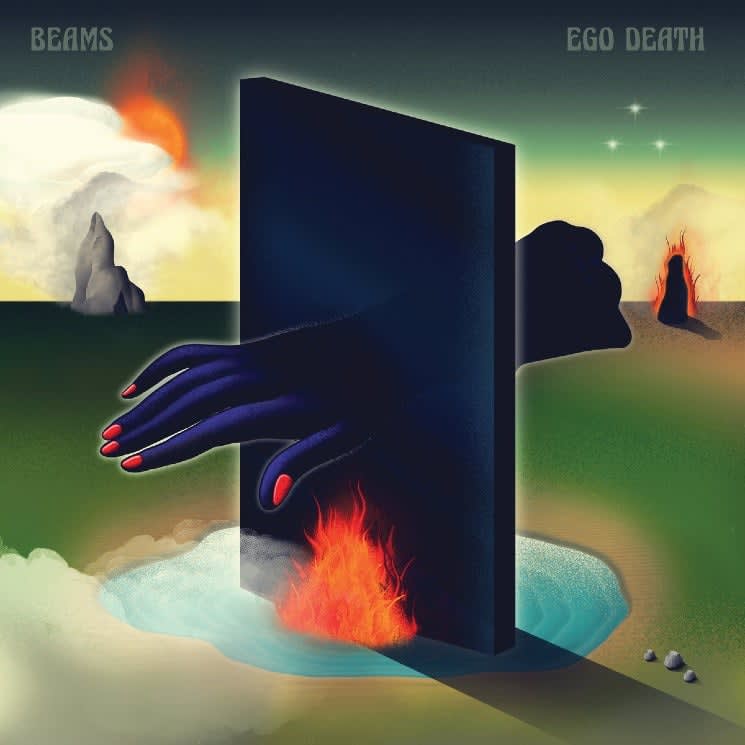For all their New York-style mystique and California-esque whimsy, one would be hard-pressed to find a band more deeply connected to Toronto than Beams, who've spent the better part of the last decade roaming the confines of the city's venues.
Though the band is generally rooted in harmonious psychedelic folk, their third full-length album, Ego Death, is, as the name suggests, a more intense move. Instead of lacing the album with pastoral, banjo-based tunes, doom and gloom take precedence here, creating atmospheres that are more ominous and unsettling than their previous works. Boosted considerably by veteran mastering engineer Sarah Register (Big Thief, the Shins, Depeche Mode) and local engineer Alex Gamble (Alvvays, Arkells, Broken Social Scene), every note is clean, purposeful and well-constructed.
In more ways than one, Ego Death is a deceptive album. While it begins hauntingly ("Born to Win"), it soon ventures into more calming territory, with "Find Me" and "Three Star System" drenched in swirling, phase-heavy tranquility. Still, remnants of their former folky selves do remain, with the dulcet "Sweet Tea" and the earthy "See the Light" exemplifying their ability to craft lush, layered acoustic music.
Because of the duality of the arrangements, the record is somewhat difficult to classify. At times, the band is firmly grounded in folk and baroque pop structures, while other arrangements see them explore thicker, rockier styles. Either way, Ego Death is a diverse and layered record that, regardless of classification, is unique in its composition.
At times, the harmonies and contours produced by bandleader Anna Mērnieks-Duffield and fellow vocalist Heather Mazhar sound oddly reminiscent of ABBA; portions of "Til the Morning Comes" are eerily reminiscent of "Chiquitita," perhaps unintentionally so. Elsewhere though, Mērnieks-Duffield soars alone, laying down smooth vocal lines alongside her band.
Though recorded in the fall of 2018 and the summer of 2019, Ego Death sometimes seems downright clairvoyant, with much of the lyrical content addressing themes that now seem oddly prescient to the world of 2021. For instance, the opening line of "Time Drain" alludes to the shattering realities of a hellish year ("This year came in like a sledgehammer").
Like many excellent musical experiences, Ego Death is a record that needs to be listened to more than once to be truly appreciated. Past the somewhat esoteric packaging lies a gorgeous narrative cycle that is as intriguing as it is complex.
(Independent)Though the band is generally rooted in harmonious psychedelic folk, their third full-length album, Ego Death, is, as the name suggests, a more intense move. Instead of lacing the album with pastoral, banjo-based tunes, doom and gloom take precedence here, creating atmospheres that are more ominous and unsettling than their previous works. Boosted considerably by veteran mastering engineer Sarah Register (Big Thief, the Shins, Depeche Mode) and local engineer Alex Gamble (Alvvays, Arkells, Broken Social Scene), every note is clean, purposeful and well-constructed.
In more ways than one, Ego Death is a deceptive album. While it begins hauntingly ("Born to Win"), it soon ventures into more calming territory, with "Find Me" and "Three Star System" drenched in swirling, phase-heavy tranquility. Still, remnants of their former folky selves do remain, with the dulcet "Sweet Tea" and the earthy "See the Light" exemplifying their ability to craft lush, layered acoustic music.
Because of the duality of the arrangements, the record is somewhat difficult to classify. At times, the band is firmly grounded in folk and baroque pop structures, while other arrangements see them explore thicker, rockier styles. Either way, Ego Death is a diverse and layered record that, regardless of classification, is unique in its composition.
At times, the harmonies and contours produced by bandleader Anna Mērnieks-Duffield and fellow vocalist Heather Mazhar sound oddly reminiscent of ABBA; portions of "Til the Morning Comes" are eerily reminiscent of "Chiquitita," perhaps unintentionally so. Elsewhere though, Mērnieks-Duffield soars alone, laying down smooth vocal lines alongside her band.
Though recorded in the fall of 2018 and the summer of 2019, Ego Death sometimes seems downright clairvoyant, with much of the lyrical content addressing themes that now seem oddly prescient to the world of 2021. For instance, the opening line of "Time Drain" alludes to the shattering realities of a hellish year ("This year came in like a sledgehammer").
Like many excellent musical experiences, Ego Death is a record that needs to be listened to more than once to be truly appreciated. Past the somewhat esoteric packaging lies a gorgeous narrative cycle that is as intriguing as it is complex.
